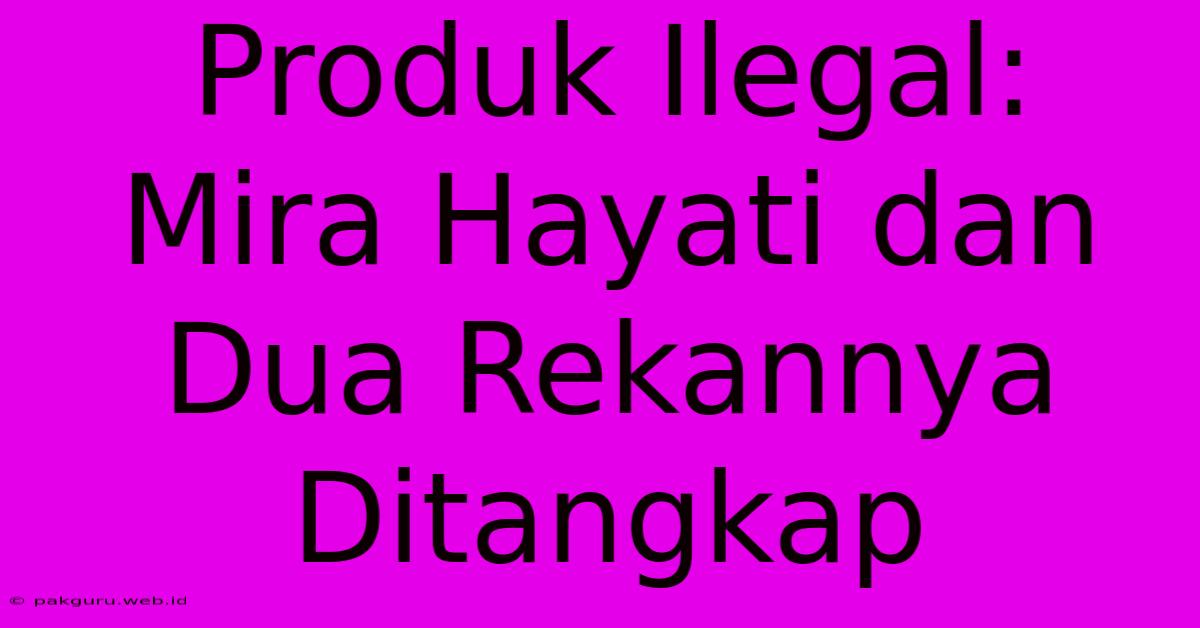Produk Ilegal: Mira Hayati Dan Dua Rekannya Ditangkap

Discover more detailed and exciting information on our website. Click the link below to start your adventure: Visit Best Website wanagama.com. Don't miss out!
Table of Contents
Produk Ilegal: Mira Hayati dan Dua Rekannya Ditangkap
Indonesia's fight against illegal products continues with the recent arrest of Mira Hayati and two accomplices. This significant development highlights the ongoing struggle against the distribution of counterfeit and unregistered goods, impacting public health and the national economy. This article delves into the details of the arrest, the types of illegal products involved, and the broader implications of this case for consumer safety and Indonesian law enforcement.
The Arrest and the Accused
Mira Hayati, along with her two unnamed associates, were apprehended by authorities in [Location of Arrest - Insert City/Region if known]. The raid, conducted on [Date of Arrest], uncovered a substantial quantity of illegal products. While specific details regarding the warrant and the exact charges are still emerging, preliminary reports indicate a serious violation of Indonesian regulations concerning the production and distribution of unregistered goods. Further investigation is underway to determine the full extent of their illegal activities and potential links to larger networks.
Types of Illegal Products Seized
Initial reports suggest that the seized products include [List types of illegal products - be specific. Examples: counterfeit cosmetics, unregistered pharmaceuticals, pirated software]. The exact quantities of each item are still being assessed, but the sheer volume points to a significant operation impacting multiple sectors. The presence of [Specific example of a dangerous product, e.g., counterfeit medications containing harmful substances] highlights the potential dangers posed by these illegal products to unsuspecting consumers. The seizure emphasizes the need for stricter enforcement of regulations to protect Indonesian citizens from harmful goods.
Implications for Consumer Safety
The arrest of Mira Hayati and her associates serves as a stark reminder of the risks associated with purchasing products from unregulated sources. Counterfeit goods, often lacking quality control and safety standards, can pose serious health risks. For example, counterfeit cosmetics might contain harmful chemicals, while fake pharmaceuticals could be ineffective or even toxic. Consumers must remain vigilant and only purchase products from reputable and authorized vendors to minimize risks.
The Broader Fight Against Illegal Products
This arrest is just one piece in the larger puzzle of combating illegal products in Indonesia. The government is actively working to improve regulations, enhance enforcement, and raise public awareness about the dangers of counterfeit and unregistered goods. This includes collaborations with international organizations and increased training for law enforcement officials to better identify and address the sophisticated methods used by those involved in illegal product distribution.
The Role of Public Awareness
Public awareness plays a crucial role in this ongoing struggle. Educating consumers about the risks associated with purchasing illegal products and encouraging them to report suspicious activity is essential. By working together, the government, law enforcement, and consumers can create a safer environment free from the dangers of counterfeit and unregistered goods. Consumers should be encouraged to:
- Check for authenticity: Verify product labels, packaging, and registration numbers.
- Buy from reputable sources: Purchase products from authorized retailers and avoid suspiciously cheap offers.
- Report suspicious activity: Contact the relevant authorities if you suspect the sale of illegal products.
The arrest of Mira Hayati and her colleagues serves as a testament to the ongoing efforts to combat the illegal product trade in Indonesia. Continued vigilance and collaborative action are vital to ensuring the safety and well-being of Indonesian consumers. Further updates on this case will be provided as they become available.

Thank you for visiting our website wich cover about Produk Ilegal: Mira Hayati Dan Dua Rekannya Ditangkap. We hope the information provided has been useful to you. Feel free to contact us if you have any questions or need further assistance. See you next time and dont miss to bookmark.
Featured Posts
-
Analisis Rating Rice And Gabriel Di Arsenal Vs Zagreb
Jan 23, 2025
-
Rodgers Celtic Tetap Percaya
Jan 23, 2025
-
Sparta Praha 0 1 Inter Lautaro Ikuti Jejak Adriano
Jan 23, 2025
-
Kane Mandul Bayern Kalah 3 0
Jan 23, 2025
-
Hasil Pertandingan Milan Raih Kemenangan 1 0 Vs Girona
Jan 23, 2025
